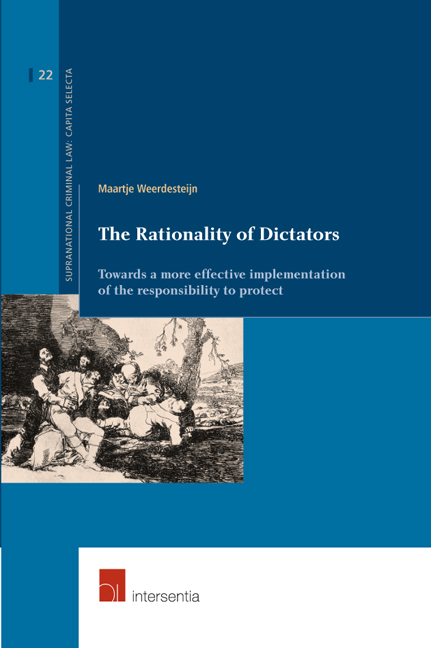 The Rationality of Dictators
The Rationality of Dictators from Part II - The Comparative Case Study
Published online by Cambridge University Press: 28 September 2018
INTRODUCTION
That ideology played an important role in shaping the events in Cambodia seems beyond doubt. Many people suffered a horrendous death because of the imposition of policies that were meant to bring forth a communist utopian society. The real question is whether Pol Pot used this ideology instrumentally because it suited his personal goals and ambitions, or whether there was a genuine belief in the righteousness of the revolution that propelled these developments. Scholars differ somewhat of opinion on this manner. Some scholars are convinced a lust for power lay at the root of these atrocities while others belief it was the uncompromising commitment to the ideology that is to blame. Chindawongse, for instance, believes that power was Pol Pot's predominant overarching goal and that the desire to change society was only necessary and desirable to obtain and maintain control over the country (Chindawongse, 1991, p. 127). According to Chindawongse,
‘the Pol Pot leadership regarded ideology as an instrument of policy rather than an idealized blueprint of objective to be achieved. Its ultimate objective was to create conditions within the CPK and to restructure social and economic relationships in Cambodia to foster the achievement and perpetuation of a political power monopoly’ (1991, p. 132).
Jackson, on the other hand found that the most important motive for the elite was the desire to create an egalitarian society in combination with utter disgust for the old regime (K. D. Jackson, 1989, pp. 54-56). Chandler does not see how one option should negate the others and is convinced that it was a ‘courageous, doomed attempt by a group of utopian thinkers’, while at the same time it was also the result of an extreme ‘thirst for power’ (Chandler, 1999, p. 3).
Other scholars are not convinced a rational explanation for the violence can be found because, they argue, Pol Pot was crazy. Polin described Pol Pot as ‘a madman who takes himself for an avenging deity’ (Polin, 1980, p. 45). Valentino, on the other hand, sees Pol Pot's paranoid psychological mindset as being intimately linked to his ideological outlook. According to Valentino, the paranoia communist leaders often suffer from is attached to the extreme Marxist outlook that they have and should not be seen as solely something which stems from ‘their personal psychological aberrations’ (Valentino, 2004, p. 100).
To save this book to your Kindle, first ensure [email protected] is added to your Approved Personal Document E-mail List under your Personal Document Settings on the Manage Your Content and Devices page of your Amazon account. Then enter the ‘name’ part of your Kindle email address below. Find out more about saving to your Kindle.
Note you can select to save to either the @free.kindle.com or @kindle.com variations. ‘@free.kindle.com’ emails are free but can only be saved to your device when it is connected to wi-fi. ‘@kindle.com’ emails can be delivered even when you are not connected to wi-fi, but note that service fees apply.
Find out more about the Kindle Personal Document Service.
To save content items to your account, please confirm that you agree to abide by our usage policies. If this is the first time you use this feature, you will be asked to authorise Cambridge Core to connect with your account. Find out more about saving content to Dropbox.
To save content items to your account, please confirm that you agree to abide by our usage policies. If this is the first time you use this feature, you will be asked to authorise Cambridge Core to connect with your account. Find out more about saving content to Google Drive.